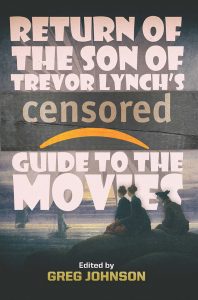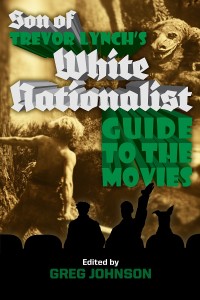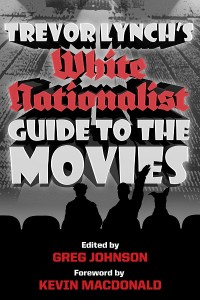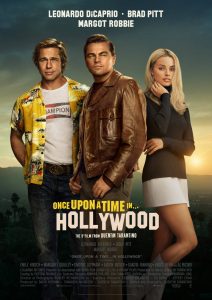Some of my best reviews are about Quentin Tarantino, but this won’t be one of them. Tarantino has gone from a director I loved (see my essay on Pulp Fiction), to a director I loved to hate (see my reviews of Kill Bill 1 and Inglourious Basterds), to a director I just hated (Django Unchained), to a director I just ignored.
Tarantino’s only great movie is Pulp Fiction, and at this point it is safe to declare that one a fluke. The rest of his works range from the distasteful (Reservoir Dogs), to amiable piffle (Jackie Brown), to nihilistic deconstruction (the Kill Bill movies), to genocidal—although self-deconstructing—anti-white Jewish wet dreams (Basterds), to genocidal anti-white black wet dreams (Django), to a movie I never bothered to see (The Hateful Eight).
And that brings us to Tarantino’s ninth feature film, Once Upon a Time in Hollywood. I planned to skip this one too, but the reviews, both positive and negative, intrigued me, and quite to my surprise, I really liked this film.

You can buy Return of the Son of Trevor Lynch’s CENSORED Guide to the Movies here
Once Upon a Time in Hollywood does not touch on deep moral themes like Pulp Fiction, but it is better than the rest of Tarantino’s films. It is not distasteful in the ways we have come to expect from him. It is not especially violent, gross, obscene, or anti-white. Basically, it is another Jackie Brown—well-crafted, likeable, and not particularly offensive. I am inclined to be grudging with superlatives in Tarantino’s case, but Once Upon a Time in Hollywood is definitely his funniest film, and although he might cringe to hear it, it is also his most morally wholesome and satisfying story.
Once Upon a Time in Hollywood is set in Hollywood in 1969. It tells the story of two buddies, Rick Dalton (Leonardo Di Caprio), who stars in TV cowboy dramas, and his stunt double Cliff Booth (Brad Pitt). Rick’s attempt to transition from TV into movies has failed, his series Bounty Law has been canceled, and he is now playing guest heavies in TV series, drinking a lot, and dreaming of restarting his career. Rick has lost his driver’s license due to DUIs, so Cliff is now his driver and sidekick.
The main Dalton-Booth plotline, which meanders along at a rather leisurely pace, is intercut with two subplots, one about Cliff Booth meeting a member of the Manson “family” and visiting the Spahn Ranch, where they are squatting, to check in on its owner, George Spahn, whom Booth had met some years before filming at his property. The other subplot is about Dalton’s new neighbor, Sharon Tate (Margot Robbie), following her through her life in Hollywood.

You can buy Son of Trevor Lynch’s White Nationalist Guide to the Movies here
Dalton, with the help of his loyal friend Booth, manages to pull out of his career slump by hard work, getting a grip on his drinking, and just general decency. He ends up in Italy, starring in three Westerns and a Eurospy romp, returning married to an Italian starlet, with fifteen pounds of pasta added to his frame.
He arrives home just in time to team up with Cliff and bring about a fairy-tale happy ending to one of Hollywood’s most gruesome true stories, which makes sense of the Once Upon a Time . . . title, which I thought was an allusion to Sergio Leone, but that was just a clever diversion.
Once Upon a Time in Hollywood is a geeky, ultra-detailed nostalgia fest, filled with vintage cars and clothes, period songs and advertisements, and a fat volume’s worth of TV, movie, and pop-culture trivia. The movie brims with actual historical characters, all of them well-cast and well-realized. The fictional characters are rich pastiches of still other historical characters. The clips and posters for fictional movies and TV shows are brilliantly realistic and often hilarious parodies. It’s all very self-indulgent, but one has to admire Tarantino’s immense energy, attention to detail, and devotion to historical authenticity.
But this poses a problem for today’s SJW critics. Windbag Richard Brody at The New Yorker condemns the film as “obscenely regressive” and “ridiculously white.” (I find The New Yorker obscenely progressive and ridiculously Jewish, but that’s a topic for another day.) Brody is silent about the fact that some of these obscenely white characters and actors are Jewish, although in other contexts, of course, Jews are “diverse.”

You can buy Trevor Lynch’s White Nationalist Guide to the Movies here
Once Upon a Time is Hollywood is all about historical exactness and verisimilitude. Hollywood in 1969 was an overwhelmingly white and Jewish town. It was swarming with liberals, hippies, and downright Communists, but by today’s PC standards, such people seem like ultra-reactionaries.
But being true to the times is no defense in an industry that now peoples medieval and Elizabethan England with Negroes. It would have been a complete violation of Tarantino’s commitment to historical accuracy to black up the cast, but artistic integrity means nothing compared to the imperative of The Great Replacement. I am sure Richard Brody would have no problem with Samuel L. Jackson playing Roman Polanski. Lord knows I wouldn’t.
Tarantino has always made prigs squirm by putting racial epithets on the screen. Here, Rick Dalton sneers about “beaners” and Cliff Booth admonishes Dalton not to cry in front of Mexicans. They also refer constantly to dirty “hippies.” In one of the funniest scenes in the film, Bruce Lee pretentiously holds forth on the set of The Green Hornet until Booth has enough, calls his bullshit, and then humiliates him in a fight.
Feminists actually pushed up their problem glasses, scrunched up their faces, and counted the lines spoken by women. They are not amused.
Dalton and Booth, moreover, are two-fisted “paleomasculine” heroes, brimming with strength, mastery, honor, and camaraderie. And at the end, the excessive TV and movie violence that moralists love to condemn is shown to be cathartic, redemptive, and downright hilarious.
Tarantino hasn’t become a reactionary, of course. He’s still a self-hating white shitlib. But he’s also an artist with his own stubbornly-held vision, and he and the leading edge of the Left Zeitgeist have parted ways.
Once Upon a Time in Hollywood is full of Tarantino trademarks: a complex narrative structure, quirky characters and dialogue, a leisurely pace, banal foot fetishism, and a love of putting complex and intelligent dialogue in the mouths of Negroes. Although there are no Negroes in this film, so Tarantino accomplishes the same comic effect with an eight-year-old white girl. The performances by DiCaprio and Pitt are by turns affable and riveting. The scenes at the Spahn Ranch are utterly suspenseful and creepy, the closest Tarantino has come to creating a zombie flick.
I highly recommend this film, simply as well-crafted grown-up entertainment that does not go out of its way to insult the intelligence, race, or moral sensibilities of its overwhelmingly white audience.
The Unz Review, August 31, 2019
Enjoyed this article?
Be the first to leave a tip in the jar!

12 comments
Excellent review. My only complaint with the film as a huge Western fan is the depiction of Sergio Leone and the “spaghetti western” genre as a graveyard for washed up actors. Also , Tarantino’s foot fetish is now borderline absurd.
The brilliance of this movie is that Tarantino didn’t give a damn about tent pole franchises,sequels,comic books and other stupid shit. He made an original film with a hot actress everyone wants to go down on. Bravo, paleo-masculinity in a world of kelp bars and soy milk. May there be more,sir.
I enjoyed it a lot. It’s like being there and hanging out with these people. The alternative history ending was hilarious and up-lifting.
It’s strange how movies or TV series about quite recent periods of American history (up until the 1980s actually) have to revert to almost all-white casts to get the historical setting straight – just noticed this in the first season of “Mindhunter”, set in 1977, f.e. It was not long ago that the US were self-evidently assumed to be a white country.
Much credit for “Pulp Fiction” should go to Franco-Canadian screen writer Roger Avary. Watch his own “Killing Zoe”, made around the same time, and you’ll see.
Smart enough review about Once Upon A Time, well I can’t complain.
My quarrel with you is about your grave underestimation of Kill Bill. It’s the best movie QT has ever made, or will ever make.
You seem to think of it as a moral, nihilistic failure. Wrong taxonomy: Kill Bill is formalist and aesthetic in nature, it’s outside of ordinary moral considerations: the fact that it is morally silly has no bearing on its excellence. It’s simply bravura film-making for the sake of the art of film-making. It’s a sort of encyclopedia of kitsch technique, slowly, carefully refined into virtuoso technique.
Its equivalent might be The Wizard of Oz, with its moral banalities but also its brilliant, evocative, unforgettable songs, characters, and production design.
You can embroider “There’s No Place Like Home” on a throw pillow as much as you like, but there is no equivalent anywhere for the Cowardly Lion singing “If I Were King of the Forest”. Kill Bill is kind of like that.
Any Captain Beefheart fan is a friend of mine.
Greg, what did you think of Al Pacino’s cameo role as the agent Marvin Schwarz? I loved how he corrected Rick Dalton when he pronounced his name with a hard z on the end and then told him to call him Marvin
The only good film Tarrantino made is “Reservoir Dogs” (1992) not a non-white in sight. I admit I like the “Kill Bill” movies.
There is one black cop in “Reservoir Dogs,” but he is there, and gone so quickly I had almost forgotten him.
“But being true to the times is no defense in an industry that now peoples medieval and Elizabethan England with Negroes.”
Tell me about it, I watched “Gunpowder” (2017) a month back, and there were two blacks in it, a scribe, and a man-servant. The bad thing about it is that most white people will think this is an accurate depiction.
While I agree with the reviewer that this flick does blessedly eschew Tarantino’s worst habits in terms of gratuitous violence and anti-white posturing, I still think it was a bad movie. Its pacing is unbearable, and while the dialogue is generally good, non of the characters are likable—or even interesting—which is a strong mark against any movie, and an especially strong mark against Tarantino since we know he can do better. I’d summarize the flick as: For two and half hours, dullards just mill about LA in ’69.
What about True Romance? Tarantino didn’t direct that one, but he did write it. Has Trevor Lynch reviewed that one yet?
I don’t remember much about True Romance.
I just disagree about Once Upon a Time, though. I wish Tarantino would try to do more tightly edited films. The story and character development do not justify the length. But I did not feel bored. I was just fascinated with Tarantino’s recreation of LA fifty years ago.
It just may be that Tarantino, with his finger on the pulse of popular culture, is picking up the growing meta-vibe of White Nationalism.
Comments are closed.
If you have Paywall access,
simply login first to see your comment auto-approved.
Note on comments privacy & moderation
Your email is never published nor shared.
Comments are moderated. If you don't see your comment, please be patient. If approved, it will appear here soon. Do not post your comment a second time.
Paywall Access
Lost your password?Edit your comment